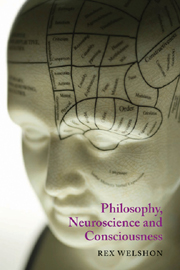Concluding semi-scientific postscript
Summary
This book has focused on three general topics. Chapters 1–4 introduced the dominant philosophical accounts of conscious properties and reduction and some of the philosophical difficulties that conscious properties and reduction pose. In Chapters 5–8, we introduced some of the recent neuropsychological and other neuroscientific findings about conscious properties and suggested how those findings have been used to help understand some of the standard philosophical difficulties with reducing conscious properties to something physical. And in Chapters 9–12, we introduced some of the current philosophical thinking about conscious properties that promises to stir up trouble about both the dominant philosophical views and the findings from the neurosciences.
It can easily seem that the philosophers' debates about the neurosciences are examples of nothing more than their familiar scepticism that strips the tread from explanations just as they are beginning to gain traction. But neurally reducing consciousness is, as I hope by now is clear, actually quite an extraordinary proposal. It is, therefore, appropriate to point out how provocative the proposal is, to describe the ways in which it is so, and to urge wariness both against being intimidated by philosophical demands for metaphysical hygiene and against being swept up by the wave of momentum spawned by advances in neuroimag-ing and neuropsychological research. This is not to discount the importance of philosophical good health or to diminish the considerable advances that have been made in various arenas of neuropsychology and the other neurosciences.
- Type
- Chapter
- Information
- Philosophy, Neuroscience and Consciousness , pp. 295 - 310Publisher: Acumen PublishingPrint publication year: 2010



